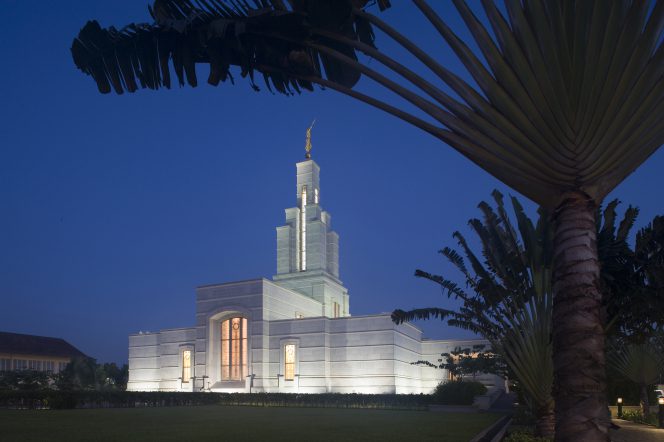
Quite a few years ago — I wish that I could find the actual discussion, but I no longer remember where or exactly when it was — I entered into an online conversation on a Jewish message board about the Latter-day Saint practice of vicarious baptism for the dead. (A controversy had recently flared about such baptisms having apparently been performed on behalf of Jewish victims of Hitler’s Holocaust.) One person, who has been monitoring whatever I do and say over the past fifteen or so, keeps extensive dossiers on me for decontextualized and distorted weaponizing against me whenever he feels the need (i.e., pretty much daily), and he is using those dossiers now to demonstrate my contempt for non-LDS faiths and, specifically, my anti-Semitic disdain for Jews. One of the props that he uses to make his point is a comment that I still remember making in the course of that online conversation. A Jewish interlocutor had accused Latter-day Saints of believing that Jews cannot be saved “on their own.” I replied that he was correct. And this, it is said, illustrates my hatred for Jews and Judaism.
With that in mind, I reproduce here a blog entry that I posted during yet another flare-up of controversy about vicarious Latter-day Saint baptisms back in December of 2017. Please note that it cites fairly extensively from Jesus and Peter and Paul, who were plainly Jewish, and from New World prophets whom Latter-day Saints believe to have been of Hebrew stock:
Every once in a while, Helen Radkey — an ex-Mormon who left the Church decades ago and plainly can’t leave it alone — tries to embroil the Church of Jesus Christ of Latter-day Saints in a scandal regarding its belief in the efficacy of vicarious temple work on behalf of the dead. Here’s a brief account of her latest effort, including a comment by my friend and Interpreter Foundation colleague Dr. Noel B. Reynolds:
“Recent Mormon baptisms for Holocaust victims questioned”
I would like, though, to comment on a remark made by Rabbi Marvin Hier of the Simon Wiesenthal Center in an article on the subject carried by the Salt Lake Tribune:
Here’s the relevant passage:
The Simon Wiesenthal Center previously asked that Wiesenthal, who died in 2005, be removed from the database, said Rabbi Marvin Hier, its founder and dean. Hier said he plans to send a letter to Mormon officials asking that his name be removed again.
“They may mean well, but it’s insulting to Jews, and it would be insulting to Mr. Wiesenthal,” Hier said. “He lived a life of good deeds, and he doesn’t need any assistance in getting to heaven.”
Well. I have absolutely no desire to insult either Jews or Simon Wiesenthal, whom I’ve long regarded as something of a hero for his efforts in tracking down Nazi war criminals.
But I must point out that no mainstream Christian and certainly no Latter-day Saint can agree with the statement “He lived a life of good deeds, and he doesn’t need any assistance in getting to heaven.” Unless, of course, the “He” involved is Jesus Christ himself. It’s the virtually unanimous teaching of Christendom over the past two thousand years that nobody — nobody — will gain heaven on the unassisted strength of his or her own righteousness. The atoning sacrifice of Jesus is required by everybody.
“For all have sinned, and come short of the glory of God.” (Romans 3:23)
“Jesus saith unto him, I am the way, the truth, and the life: no man cometh unto the Father, but by me.” (John 14:6)
“Neither is there salvation in any other: for there is none other name under heaven given among men, whereby we must be saved.” (Acts 4:12)
“Wherefore, redemption cometh in and through the Holy Messiah; for he is full of grace and truth.
“Behold, he offereth himself a sacrifice for sin, to answer the ends of the law, unto all those who have a broken heart and a contrite spirit; and unto none else can the ends of the law be answered.” (2 Nephi 2:6-7)
“For we labor diligently to write, to persuade our children, and also our brethren, to believe in Christ, and to be reconciled to God; for we know that it is by grace that we are saved, after all we can do.” (2 Nephi 25:23)
“And this is the means whereby salvation cometh. And there is none other salvation save this which hath been spoken of; neither are there any conditions whereby man can be saved except the conditions which I have told you.” (Mosiah 4:8)
This is very basic Christian doctrine.
Now, I fully understand that Jews (and others) disagree with this doctrine. That’s fine. That’s what religious pluralism is all about. But here’s something else that’s entailed by a commitment to religious pluralism: We must grant others the right to believe things that we don’t believe and, unless doing so violates the rights of those around them, the right to act on those beliefs.

I’m guessing, from what he told me, that my father, a sergeant in the Eleventh Armored Division of General George Patton’s Third Army, passed through this very same gate within a few minutes (at most) of this public domain photograph. What he saw there powerfully affected him for the rest of his life, and he told me about it on many occasions, imploring me never to forget what he said. I never have. I regard remembering it as a sacred duty both to my father and to the victims at Mauthausen, to which I’ve made a number visits that, for me, have the character of pilgrimage.
I think that I also have some sense of the sensitivities and sensibilities of Jews on the matter of preserving their identity and resisting forced conversion.
No non-Jew, I’m sure, can fully understand what it feels like to be a Jew. But my periods of residency in Israel and my many visits there (more than I can count, extending back to 1978), my reading, my repeated visits to places like Mauthausen and Buchenwald and Yad Vashem and the United States Holocaust Memorial Museum, and, perhaps most of all, my having been raised as the son of a man who participated in the liberation of the KZ-Mauthausen death camp — the very camp in which Simon Wiesenthal was a prisoner — and who was forever marked by that experience, have not failed to sensitize me to the painful history of the Jews. In fact, I’ve been very deliberate about trying to understand it, and to feel it.
So I’m not cavalier about this issue. Not at all.
But I want to humbly point out what everybody needs to understand in this regard: Latter-day Saints do not regard vicarious baptisms as ipso facto conversions. We do not count those for whom such baptisms have been performed on the rolls of our church. We see such ordinances as offers, not as coercive. Free, uncompelled human agency is utterly fundamental to our theology.
And I also want to point out that the Church of Jesus Christ of Latter-day Saints has plainly attempted to be sensitive to Jewish concerns.
Finally, this passage in the Tribune article also caught my eye:
“Radkey also uncovered attempts to baptize people still alive or recently dead such as O.J. Simpson, Charles Manson and mass shooters Stephen Paddock and Devin Patrick Kelley.”
Attempts to have vicarious baptisms performed on behalf of the living are plainly violations of both Latter-day Saint policy and, rather grossly, of Latter-day Saint doctrine.
I don’t know who submitted such names. Candidly, given her persistent efforts over a very, very long period to play the headline-grabbing agent provocateur, I wouldn’t be at all surprised if it were Helen Radkey herself, or one of her allies, who did it.











